SummingUp
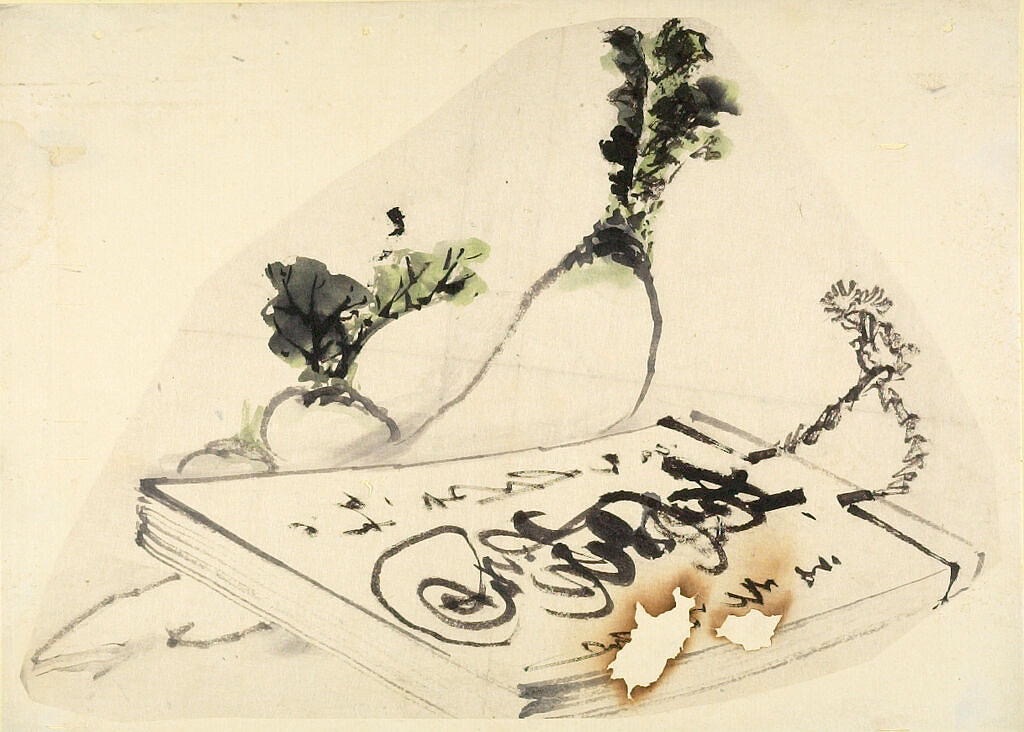
Unknown Artist:
Daikon Radish and Accounting Book
(19th Century)
"I'm still wondering."
I create my series off calendar. I begin each on either a solstice or an equinox so that the ends of months and years never mark the end of any series. The twelfth installment of this iOlogue Series falls on the last day of this year, 2023, and it feels right as well as proper to pull over here and at least try to take stock of what this year has wrought or what I've managed to wrought this year. Reviewing my work, I'm first taken by how little I crisply remember. It seems to have left little in any way resembling a permanent impression. I have written daily, ninety-some stories each quarter, at least two-hundred-sixty over the year in parts of five different series, yet I have to reference my archive to even remember the names of the series I labored so diligently to produce.
What must it mean to have produced so much while remembering so little?
TalkingMyselfThrough
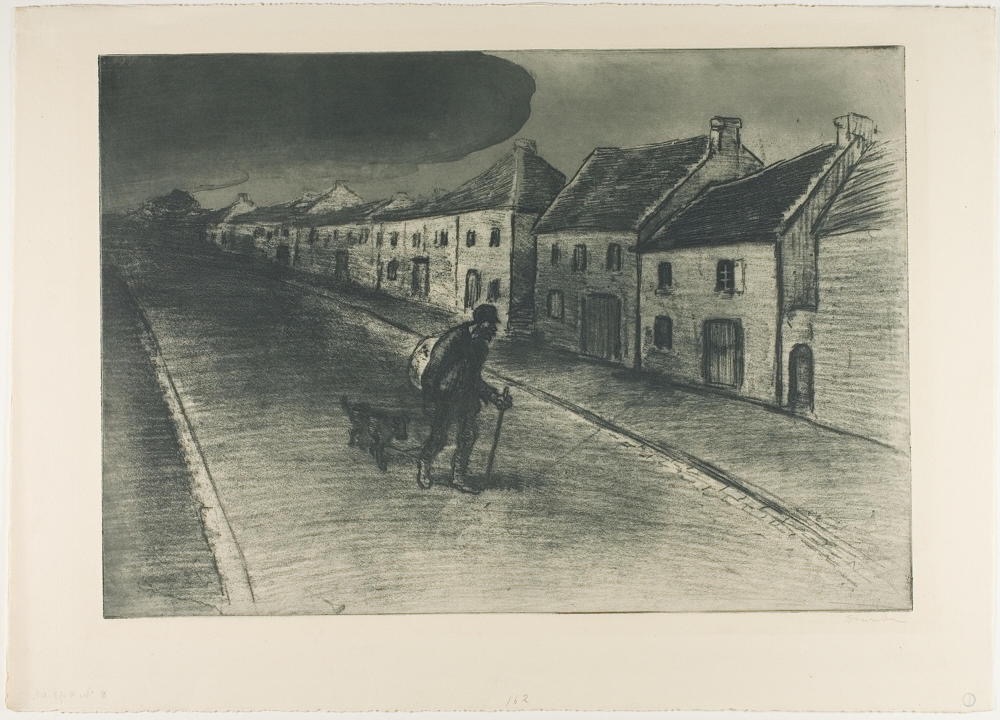
Théophile-Alexandre Steinlen:
Tramp Passing Through a Sleeping Village (1902)
"I still have mentors, but none better than the one I found lurking near the end of my journaling pencil."
As my fortieth birthday approached, my life grew increasingly complicated. I had not willed this change. It just seemed to visit me unbidden. Fortunately, helpers emerged as if somehow deliberately called to assist. Powerful teachers just seemed to find me and I entered into a fresh phase of learning, of living. Almost everything in my life would have to crumble before I would emerge on whatever passed for the other side, but the shift was never nearly as clear-cut or dichotomous as that. It first felt like a descent from my achievements long before it seemed anything like an improvement. I later learned that this challenge had long been considered routine, nominally labeled Mid-Life Crisis. The reality of the experience far overshadowed the seemingly benign name we'd assigned to it. In his Divine Comedy, Dante described it: "In the middle of my life, I awoke in a dark wood where the true way was wholly lost."
I was merely on the edge of learning my most profound life lessons thus far.
Writing Summary For The Week Ending 12/28/2023
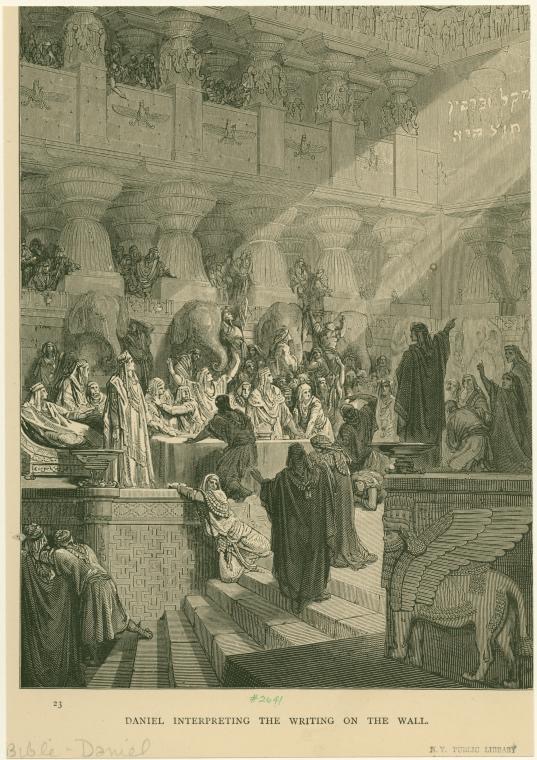
Gustave Doré:
Daniel interpreting the writing on the wall (1866)
The Mysteries Will Prevail
I tell myself I keep moving forward but cannot honestly tell. I lack the perspective to determine. I follow my established as well as emerging rituals, wondering where all this might be leading while simultaneously convinced that I know full well where I'm headed. Writing seems to be one of those skills where, to be successful, one must never know before finishing. That not knowing might serve as the absolutely necessary predicate to achieving. One comes to know without knowing beforehand. The initial innocence and ignorance serve as essential leverage. No reader needs to understand any of this. In fact, the reader's experience might be improved by their misconceptions of what authorship entails. It involves much speculation and ritual with a pinch of discovery mixed in. Some weeks prove more enlightening than others. Some prove stellar. There's never any predicting except that the mysteries will prevail; there will never be any vanquishing them.
TalkingMyselfInto
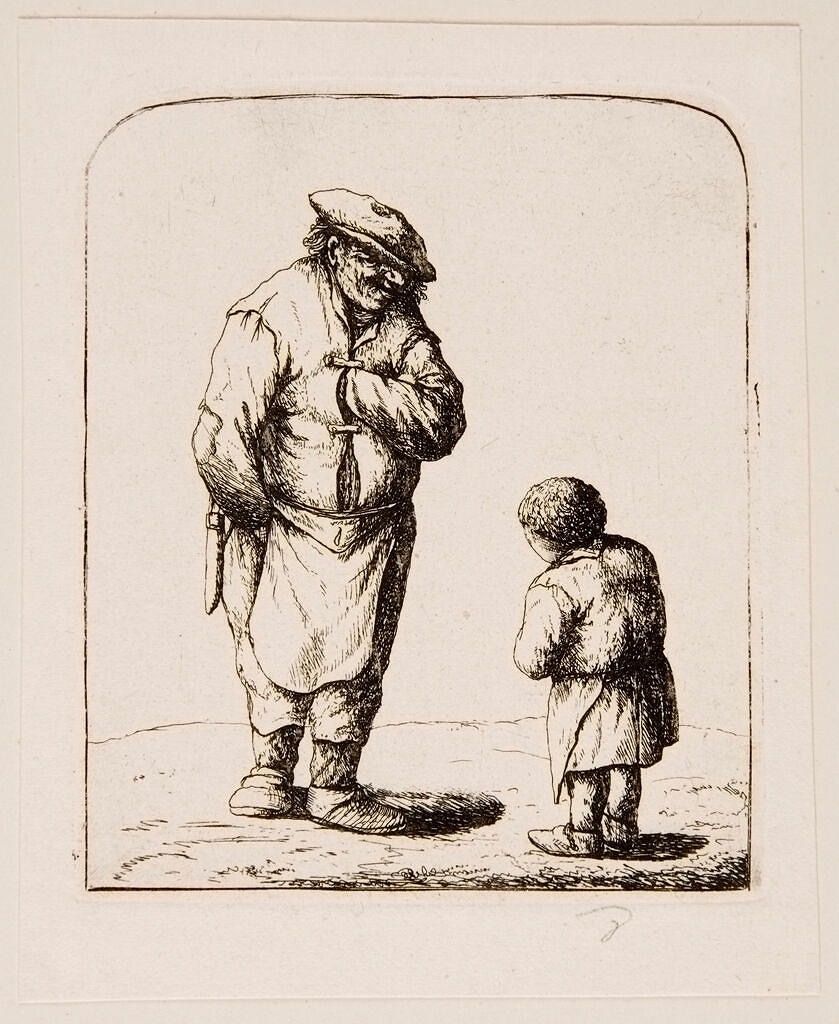
David Deuchar:
Man Wearing an Apron, Talking with a Boy
(18th-19th century)
" … I just have to try your patience first."
I tend to be a tough sell. Try as anyone might, I often prove inconvincable by any means, or any means other than one. In the end, if I am to be convinced, it just has to be me doing the convincing. I mean I have to TalkMyselfInto it, whatever it is. I need to find my own damned reason and cannot ever quite countenance acquiescing to anyone else's. I suspect my apparent stubbornness stems from my sense that I'm natively gullible, too easily persuaded or goaded into doing what's not always best for myself. I hate to say it, but I distrust. Last night at dinner, a trainee waiter admitted that he was upselling, an admission that undermined his purpose, but he was still learning. I would that everyone attempting sales could engage so transparently. I don't mind being upsold as much as I resent being fooled. Why do salespeople seem to treat honesty as their enemy?
I often simply fail to understand at first.
SelfTalk
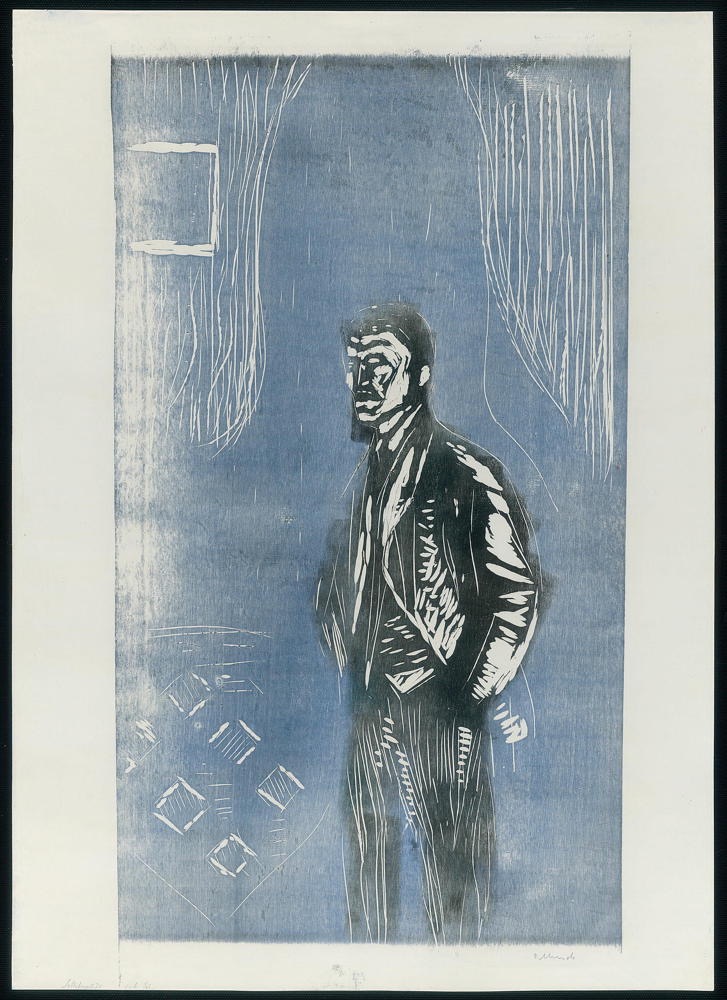
Edvard Munch: Self-Portrait in Moonlight (1904–06)
"I might one day learn just to appreciate its presence…"
My story shifts from day to day. One day, I might feel the hero, and another, the cad. More consequently, the story I tell myself about myself also constantly shifts. Whether I think myself a hero or a cad might matter. Some studies suggest that I might even be capable of talking myself into performing either role by simply repeating a story suggesting as much. SelfTalk, one of the pillars of the ever-burgeoning self-helpless industry, refers to these stories we tell ourselves about ourselves. The accuracy of these stories seems to have little to do with the effects they encourage. If I think myself a cad and tell myself stories reinforcing this notion, I might be much more likely to act out as if those stories were accurate in what might be considered a self-fulfilling prophecy. Regardless of its initial validity, I might become the story I tell myself about myself.
This notion suggests that I had best be careful when choosing my internal narrative, implying that I should nurture only the best opinion of myself regardless of my actual performance, lest my SelfTalk degrade my experience.
Holidayed
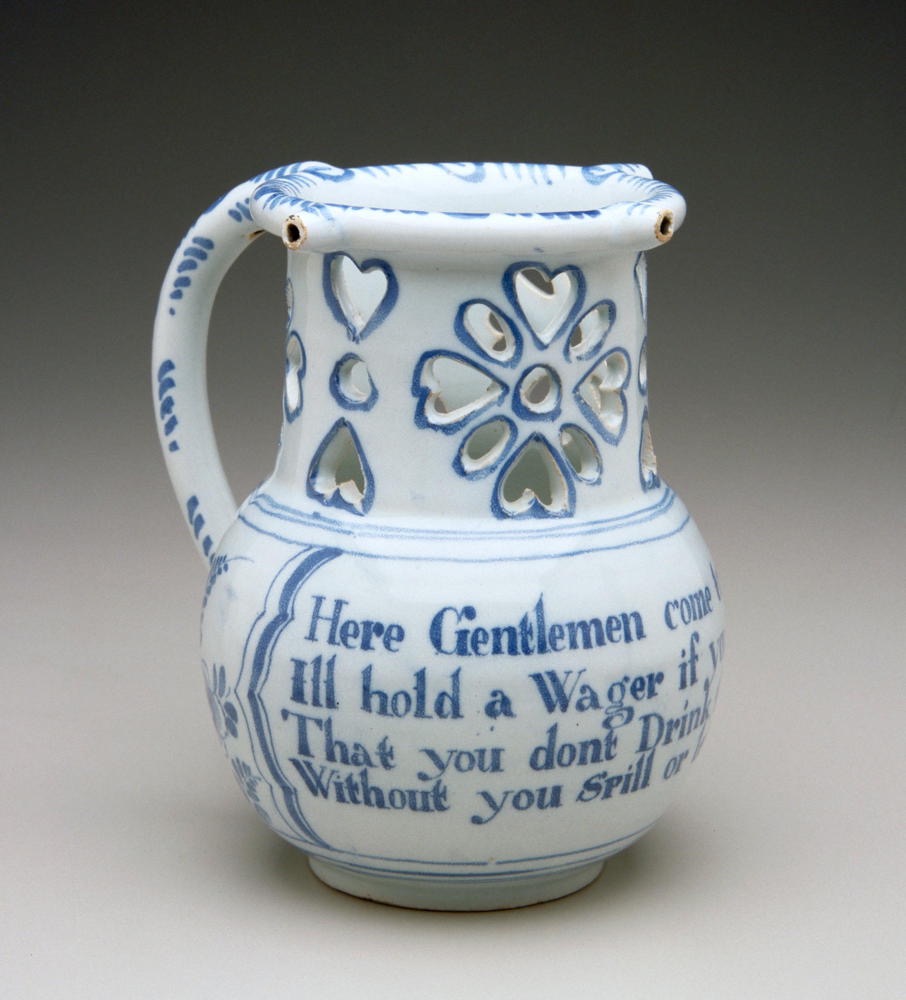
Unknown: Puzzle jug (c. 1750)
"The chestnuts, alas, were inedible after roasting."
For me, holidays mainly exist in my anticipation of them. Before they occur, I feel perfectly free to imagine them becoming anything. Once they arrive, my degrees of freedom when anticipating collapse into one or two definite outcomes. By the end of the day, not even that was left: a kitchen filled with dirty dishes and some lingering puzzles about what that was supposed to be about. They were never any different. The jolly tends to leach out a day or two before the mistletoe engages and seems scarce on the actual day of. The day of becomes more focused on producing tangible results, inherently less satisfying effort than anticipating ever was. Stockings hung hold enormous potential. Once filled, they become more or less has-beens until the following ultimately hollowing season.
The absence of the need to be preparing eliminates what had been my primary motivation. It had been what had been getting me up mornings.
Epiphany

Paul Cézanne: Jules Peyron (c. 1885-1887)
"There will always be the before and then the ever after …"
I am an Epiphany junkie. The urge to experience Epiphany drives me. It's what gets me up in the morning. I am always, always looking for the anomaly, the odd ant/elephant combination that might harbor an insight, for I believe Epiphany to be accessible to everybody all the time. Certain religious holidays advertise themselves as Epiphany-related, but I firmly believe that everyone retains access to the transcendent, to the glorious. It's not reserved for Sundays or Feasts of Grand Retribution but remains an everyday thing, extraordinary yet perfectly ordinary, remarkable yet common.
Remarkable Yet Common might as well serve as my tagline, for I have no personal use for the exclusive.
InfiniteSets
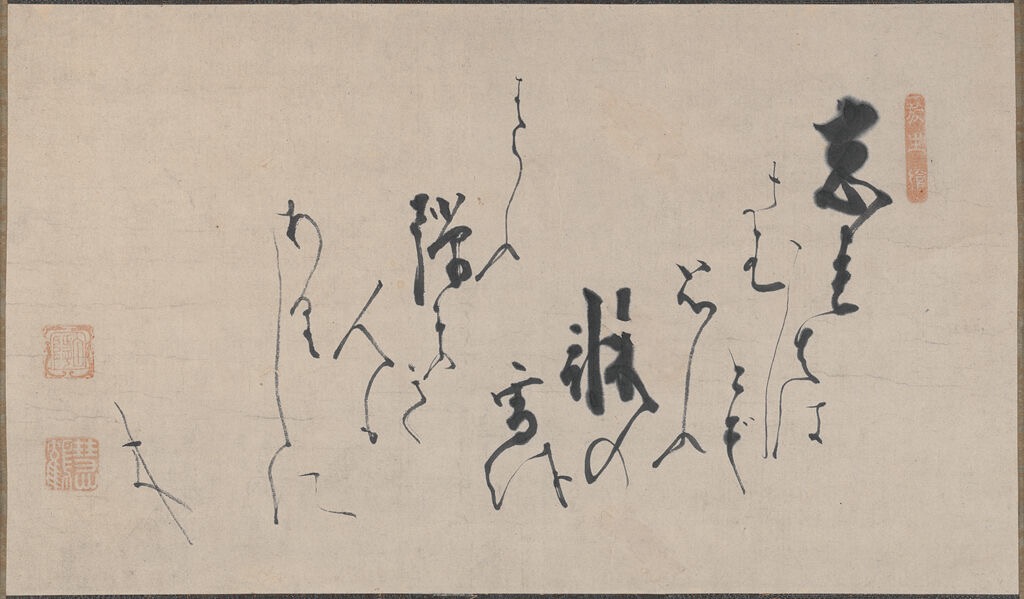
Hakuin Ekaku 白隠慧鶴:
Poem on Meditation [Poem about Snow]
(Edo period, 1615-1868)
"I carry on these internal dialogues as if they might prove helpful."
I realize that every one of my dilemmas stems from dealing with essentially InfiniteSets. I define an InfiniteSet as any entity, idea, or thing that seems fundamentally indeterminate in size. These might, indeed, qualify as uncountables or just prove essentially impossible to count. Any entity so vast as to chase off any practical strategy for rendering it definite becomes infinite by default. By this definition, I am presently living an infinite life because while I know for sure it will at some time end, that ending remains essentially indeterminate. This need not goad me into profligacy, for I can always respect my potential without burning whatever candle I have remaining at both ends. I can conserve as well as consume my InfiniteSets.
I can write because language proves to be one of those essentially InfiniteSets.
PoemCycling
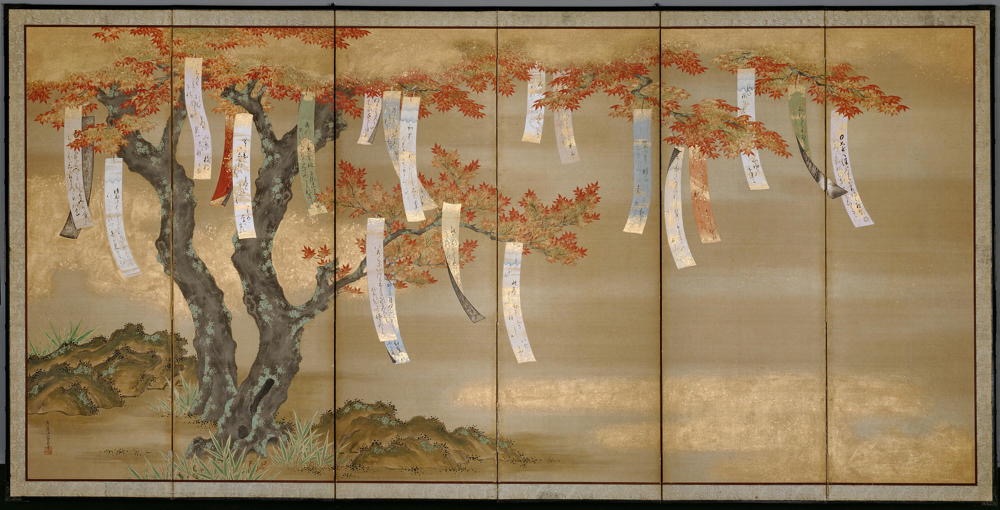
Tosa Mitsuoki:
Autumn Maples with Poem Slips (c. 1675)
"I suspect Santa experiences a similar reveal …"
For each holiday season for at least the last twenty years, I have created a poem cycle instead of buying presents. A poem cycle amounts to a small collection of poems written on more or less the same subject, this cycle's topic: the Winter holidays. I give the resulting poems to family and close friends instead of giving them something I've purchased. I devised this strategy after many years of disatisfying effort attempting to guess what gift might please which recipient. I was always a lousy guesser, and I suspected that I usually guessed wrong, though few ever confirmed my suspicion. Feigned delight resulted in gracious acceptance being the exchange's only redeeming element. In the first few years, the poems seemed an even lamer excuse for gifts, but over time, recipients grew to expect them and transferred their feigned acceptance to this new medium. Don't get me wrong, these were rarely James Whitcomb Riley-quality works. They were, by and large, lame poems exhibiting, above all, just how much it might be the underlying thought that actually counts.
I initially held myself to producing these works between midafternoon Christmas Eve and Christmas Morning.
iAloguing With The Deafened

Will Hicock Low: Deafening the Swallows’ Twitter, Came a Thrill of Trumpets (1885)
" … a halfway decent conversation with myself."
As one newly introduced to iOlogue, the fine art of solo dialogue or talking to myself, I can report that it's a challenge, given all the foreground noise. If I didn't know better—and I might not know better—I'd insist there's a vast and insidious conspiracy against anyone even attempting to hear themself think, just as if they considered that sort of thing dangerous and to be dissuaded at every turn. Significantly, during this sacred season, the competition expands beyond all reason. Wherever I go, holiday music follows or greets me as I enter. I recognize that It's Looking Like A Lot Like Christmas without having that recognition blasted into what's left of my consciousness every time I enter a store. I know why I cannot remember what I came into the store to purchase because my inboard navigation system was short-circuited by the Musac® there.
Even when it's not the sacred season, the competition seems staggering.
Writing Summary For The Week Ending 12/21/2023

Forbes Mac Bean: Public Writer (1854)
Whatever Change Was Supposed To Promise
I believe we're all here to spot curious convergences. We might try to establish routines to make our lives more efficient, but something, thank Heaven, always seems to manage somehow to disrupt them. While we struggle to reestablish what was probably never destined to be sustained, we tend to stumble upon change. We speak of change as if we might one day master it, but I believe we're destined to remain its humble or humbled servant. Our clever strategies for creating it often leave us feeling like fools while its designs for insinuating itself into our lives properly leave us gasping. We were never intended to master change but to be shifted by it. We should lose our mooring. We should lose our heading. When we can keep our wits about us, we often spot something interesting. When we lose our wits, the experience can become even more interesting. Reasoning’s definitely not required. Of course we cannot yet understand its eventual significance. It travels in relative obscurity, seemingly fueled by synchronicity, accidentlies on purpose, accidentlies bringing renewed purpose in clever disguise. This final week of GoodNuff stuff brought all of whatever change was always supposed to promise. I feel changed for the good as a result.
FinishingIn
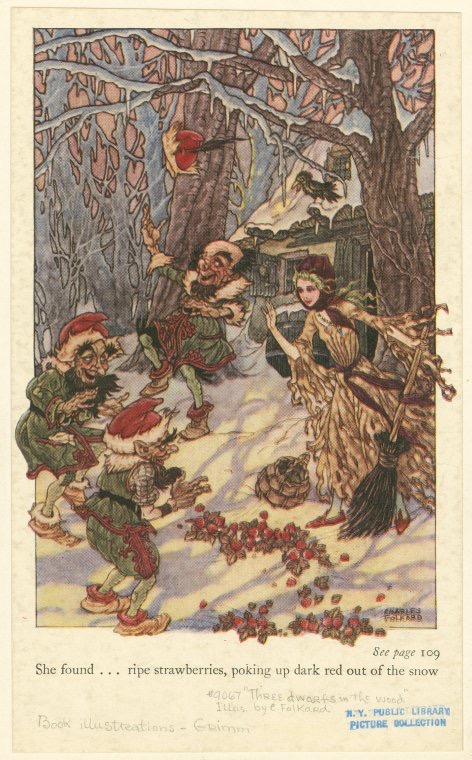
Charles Folkard:
She found...ripe strawberries, poking up dark red out of the snow. (1911)
"… an appropriate backdrop for such a ragged undertaking."
I do not believe in smooth transitions but ragged ones. In theory, we finish before beginning anew, but we probably never do in practice. There's always some tail dragging behind the prow, some finishing touches needed even after a masterpiece was exhibited. I segment my days into tidy-seeming stories, but my internal dialogue discloses the underlying mess. I require much forgiveness to start before I've completely finished, but I could never begin if required to complete my prior work. Yesterday, I published my reported "last" installment of my GoodNuff Series. I even accomplished what I'd never managed before. I completed assembling those ninety-four stories into a finished manuscript. I even compiled them into a single document, complete with illustrations, suitable for submission on the same day I posted the final piece. I usually drag a finished series behind me for a very long time before I finally catch up to compiling the completed manuscript. My life seems more than littered with unfinished business.
The moment I finished compiling that series, though, The Muse mentioned that I'd misspelled something in that last story, negating my advance.
iAlogue
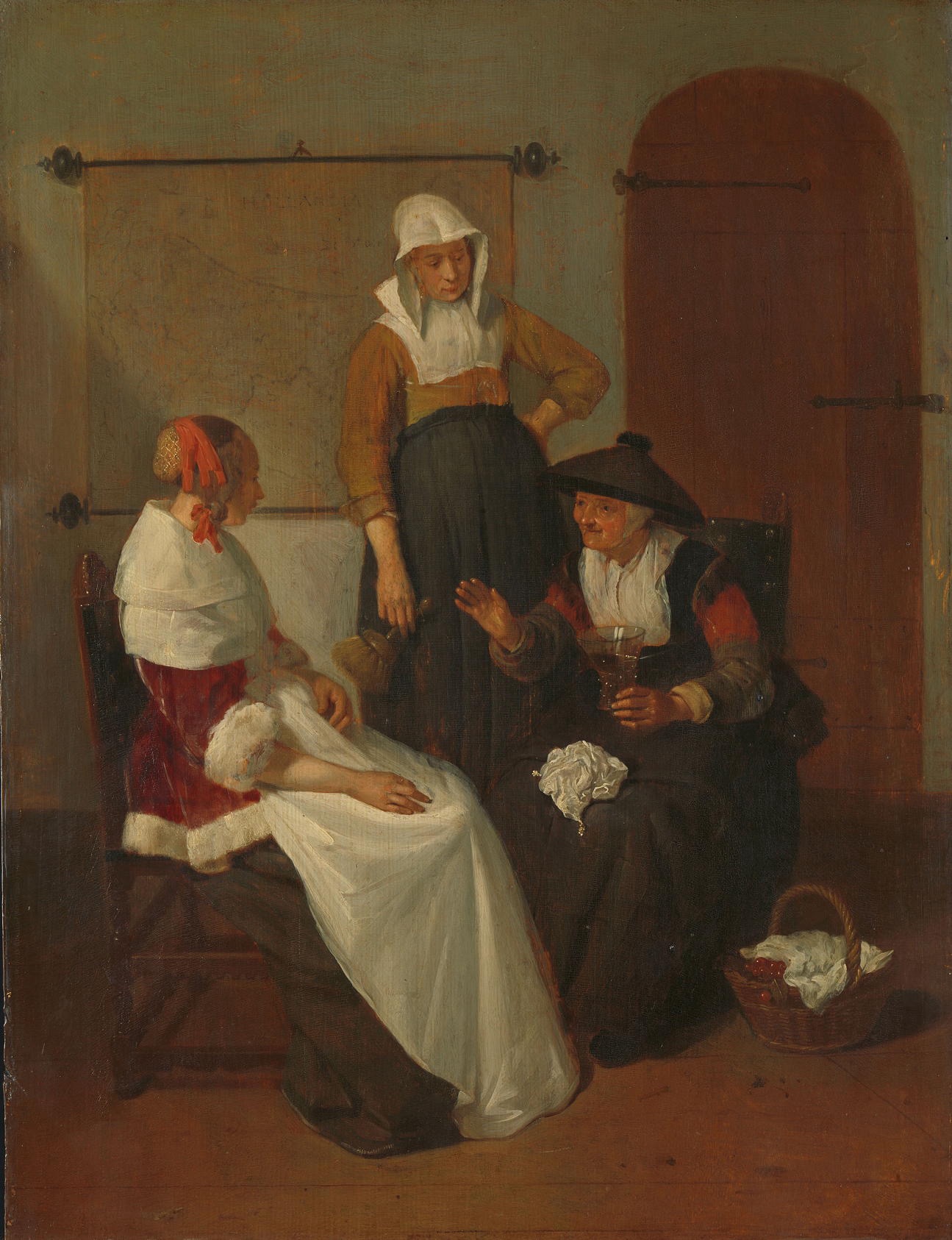
Quiringh Gerritsz. van Brekelenkam:
A Confidential Chat (1661)
" … engaging in solo dialogue …"
It's accepted wisdom within the publishing business that an author must know his comparables. This essential knowledge becomes critical when classifying a work, and classifying has always been necessary before a work can become a marketable book, for without a classification, no librarian or bookseller could know where to display the damned thing. So, a few years ago, I asked a friend who teaches library science at a prestigious Eastern university to gift me with a classification for my work. He returned with one I found only distantly satisfying: Historical Autobiographical Philosophical Fiction. He claimed this grouping included many of the most popular authors publishing today. I felt flattered to be included in any category, let alone such a prestigious one, but I couldn't help feeling like I was still missing something.
The authors he listed as comparables didn't seem to be in the same business as I had been.
HowIDo2
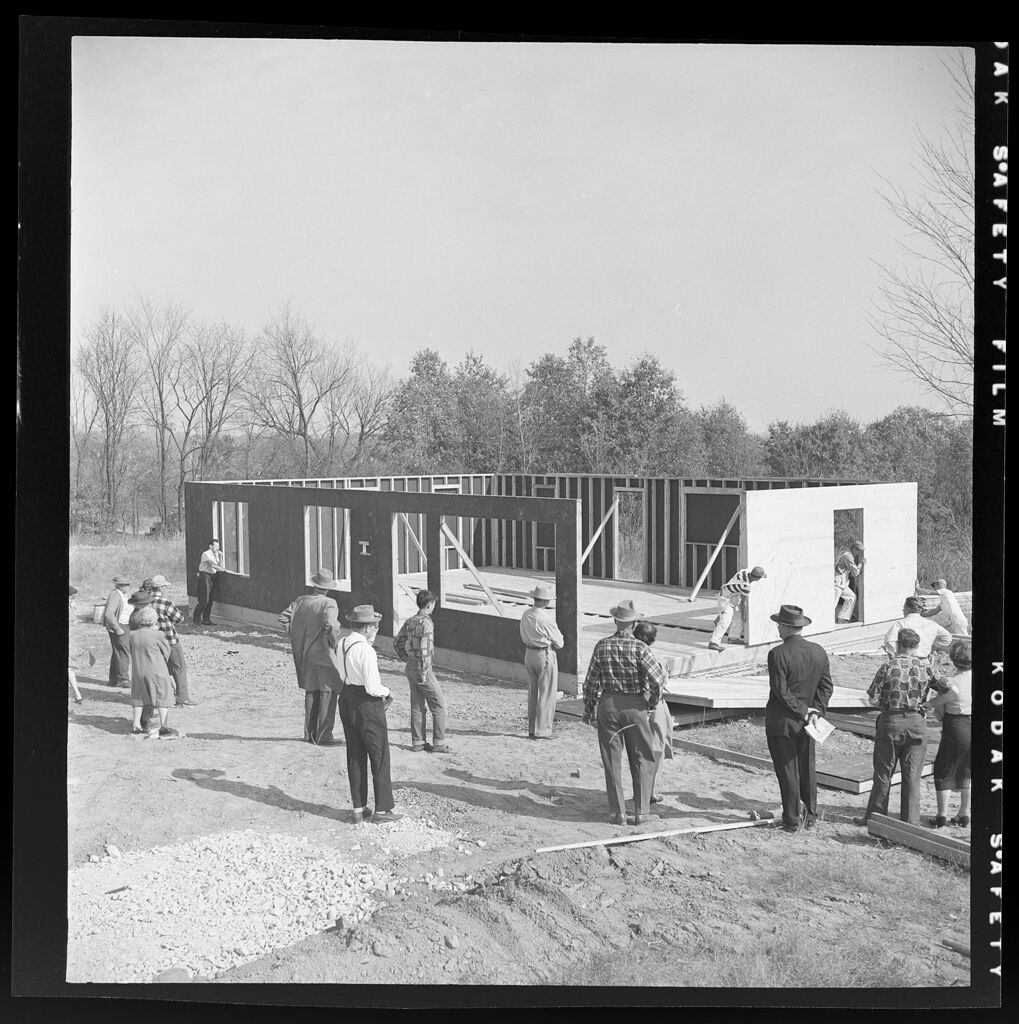
Jack Gould:
Untitled [workmen constructing new house] (1950)
“Another GoodNuff Story's published!”
Like with all activities, "finishing" does not necessarily mean done. I say I'm writing even though the writing might take up less than half the time I spend "writing." As I said in the last installment, the writing, initiated after lengthy context and content-setting work, occurs in timeless space. I must not think too much while writing lest I disrupt what might pass for flow. I learned long ago to separate editing from writing, for instance, because the two activities remain antagonistic and seem better left sequential. Once I've "finished" writing, I begin editing. If anything, I've increased my editing efforts in more recent years. I once over-revered my native voice, preserving my hems and haws as representing greater authenticity. In most realities, many asides make for difficult reading. Editing can streamline stream-of-consciousness writing, rendering it more palatable, understandable, and, therefore, more enjoyable to read.
I start my editing passes by slowing myself down.
HowIDo
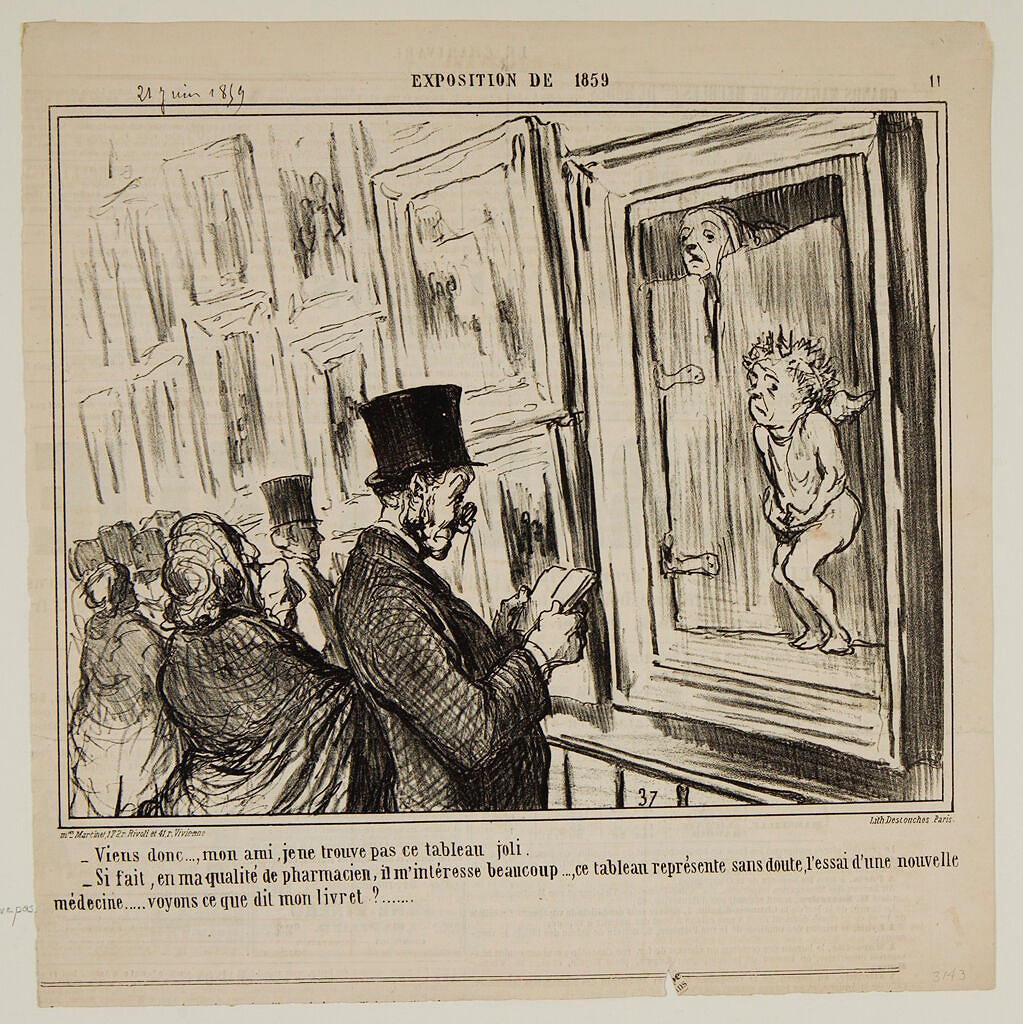
Honoré-Victorin Daumier:
"Let's go..., my friend, I do not find this painting pretty..."
From the book:
L' Exposition de 1859, 11 (Le Charivari, 21 June 1859)
Original Language Title:
"Viens donc..., mon ami, je ne trouve pas..." (1859)
Writing, like all activities, has little to do with itself. The activity of writing seems almost beside the point, for much context-setting and content-framing work must occur before writing can productively commence. These set-up activities sometimes prove insurmountable, especially if a writer cannot transform many into rote routines or preparatory rituals. I think of my writing set-up routine as sacred since all I produce must first pass through it. Without it, I could produce precisely nothing, so my HowIDo explanation seems worthy of perhaps even an overly wordy presentation with pictures. Here come some picky details:
Who knows where the idea of a story originates?
WhatIWillNot
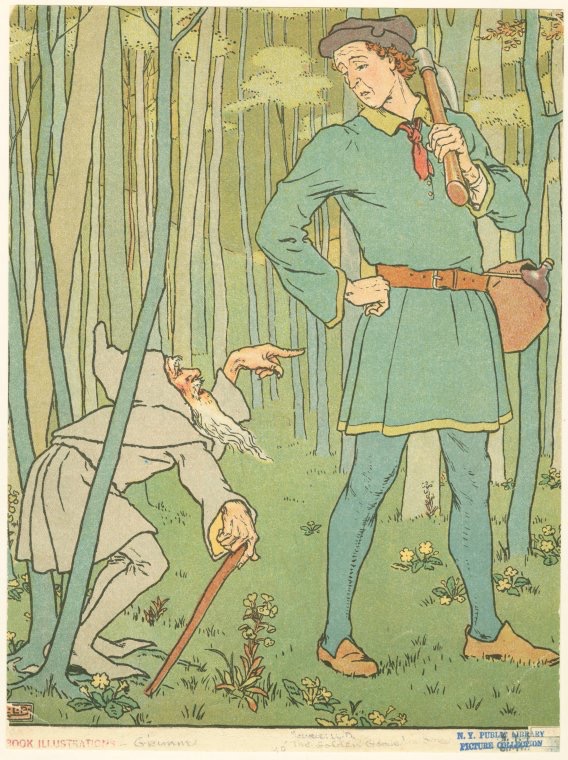
Leonard Leslie Brooke:
The eldest son refuses the old grey man
[from The Golden Goose Book] 1905
"I am my own audience."
I have made some decisions over the years I have engaged in this writing experiment. I have been honing my skills, which always involves removing some of the blade to improve performance. Less becomes more. I would write about anything early on, for my explorations remained relatively unconstrained. I had yet to develop many preferences and had not formed what I might describe as taste. I would catch myself being myself and sometimes quake at what I witnessed. That much of my early work was uninformed by very much of a body of preferences showed in ten thousand ways. With many repetitions, some druthers emerged slowly, ranging from preference choices to down-right insistences. Mark Twain insisted that the primary difference between the common jackass and the typical human has always been that there are some things a common jackass won't do. With adequate iteration, though, even the typical human might manage to back into a list of things he steadfastly refuses to do.
I refuse to dispense advice.
WhatIDo
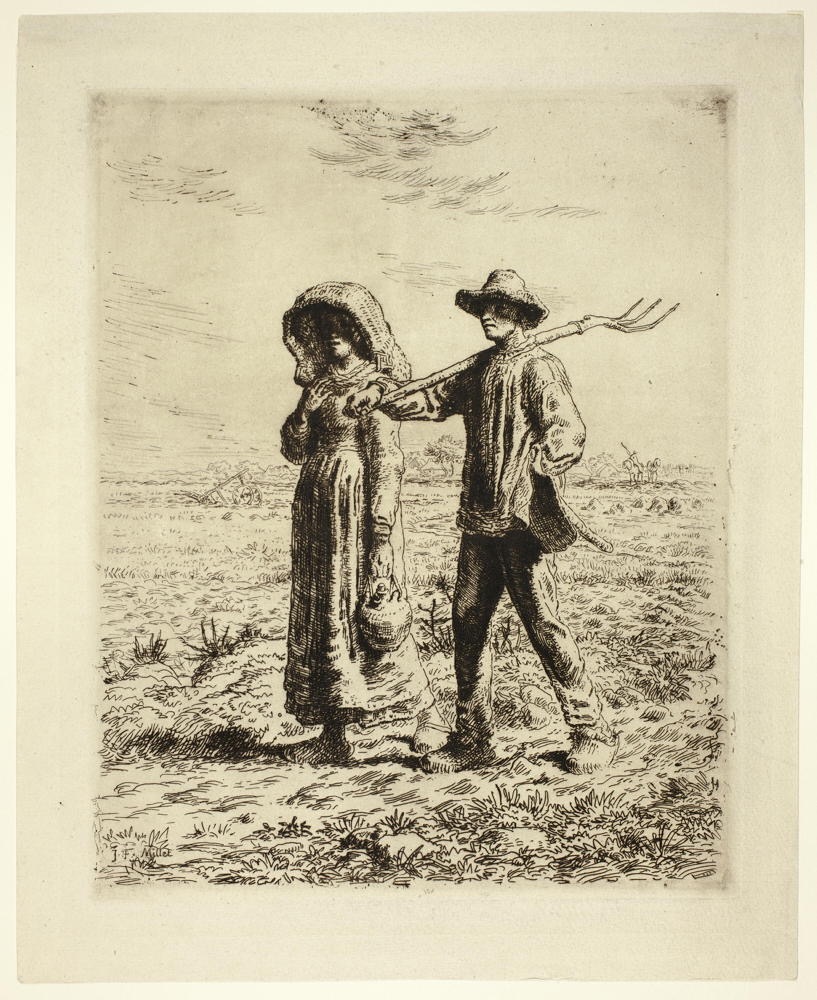
Jean François Millet: Peasants Going to Work (1863)
"If you glimpse yourself in there, you're finally seeing the other."
I write loosely autobiographical sketches, whatever that might mean. What that might mean remains an issue of considerable interest to me since I turn out to be the author of my experience, of these experiences. I harbor deep doubts that I know how to actually do what I claim to be up to. So deep run those doubts that they entice me up and out of my bed every morning to see if I might manage to prove my case to myself. Some mornings, I feel as though I've come close to approaching that purpose, but even then, I still feel aspiring.
My specific autobiographical details should properly be of little interest to any of my readers.
Writing Summary For The Week Ending 12/14/2023
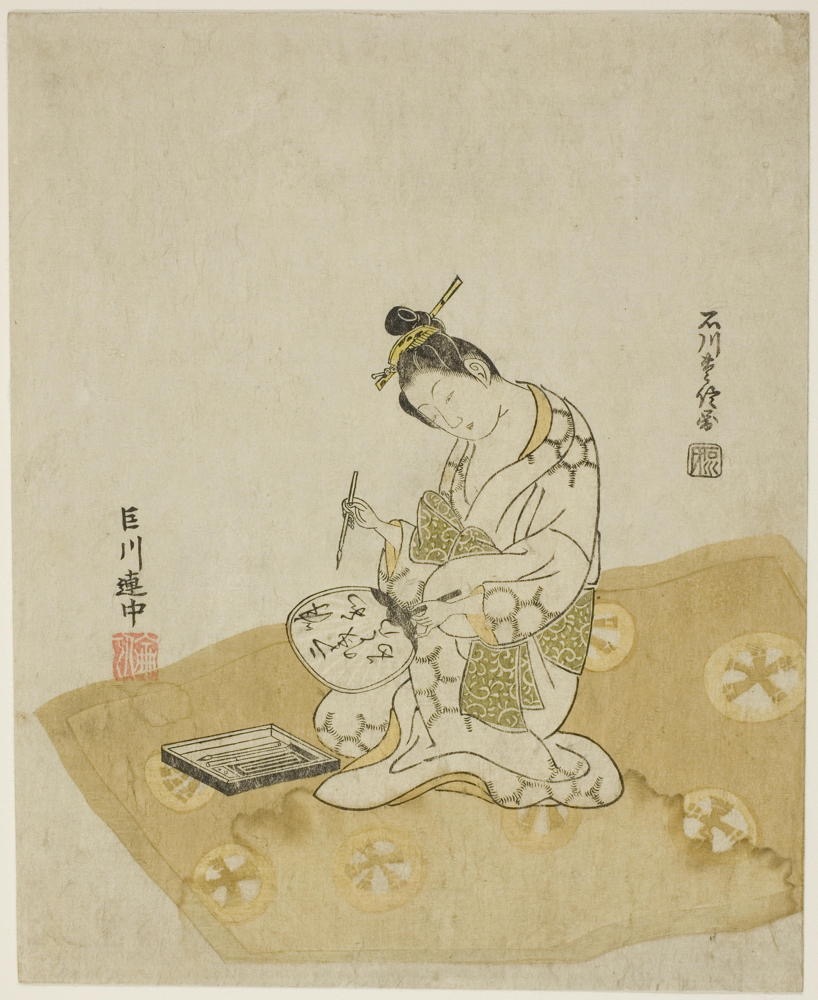
Ishikawa Toyonobu: Writing on a Fan (1765)
"I work for nobody but my legacy and my readers now."
I have been wondering with renewed energy what I have been doing here for the past six and a half years. From the morning I began writing this series of series, Summer Solstice 2017, I have been dedicated to producing stories every blesséd morning. This occupation has almost always been refreshing. I do not very often consider this occupation all that onerous. I have been learning—perhaps even teaching myself—that my muse proves reliable. When I ask, she delivers. I seldom even need to insist. But now, as I look at this next to last week of my twenty-sixth series, I suppose I'm bumping into one of those Is That All There Is? Moments where I feel compelled to question purpose. I began wanting to describe my manner of living, whatever that might mean, and have ended up creating an overwhelming result, something on the order of ten thousand pages. It would take me over two and a half weeks just to read through the twenty-six manuscripts. I have copyedited only a few of them to completion. Am I destined one day to cease producing new stories so that I might focus my attention on the previously finished ones? I wonder what anyone might glean from reading them. I wonder what I might glean from rereading them.
I suspect my questions amount to completely normal ones, for nobody ever knows the ramifications of anything they're doing from the beginning. We begin in innocence—necessary and beneficial—and work toward experience. We should rightfully wonder along the way what we originally intended, whether that intention holds and has proven satisfying. As I back into the longest night of the year, my path should rightfully seem obscured. I had no real reason to believe that I knew what I was doing. I might feel perfectly free to change my justification along the way. I work for nobody but my legacy and my readers now.
BackToWork
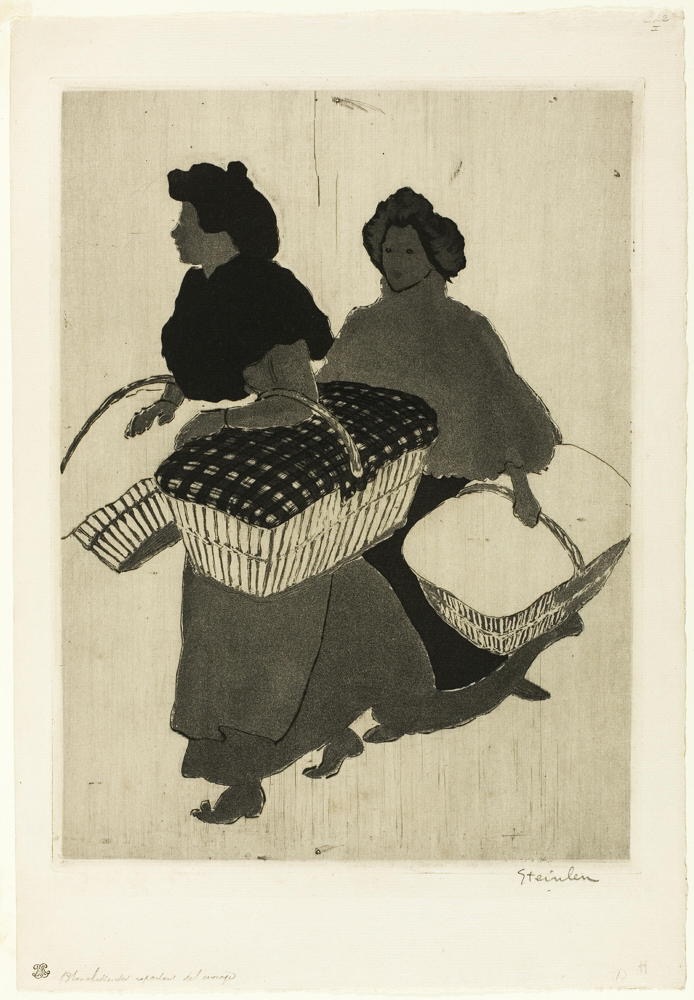
Théophile-Alexandre Steinlen:
Laundresses Carrying Back Their Work (1898)
"It might qualify as an obsession."
With one exception, whatever else I'm doing, I know what I should be doing instead. I should be doing my work instead of whatever else I'm doing unless, of course, I'm doing my work. I might be obsessed, though I confess I do not know how to do otherwise. My work calls me, and it punishes me if I do not heed it. I fear offending whichever god granted me my work, for I do not feel as though I chose it. Maybe it chose me. However it came to be, it owns me. It jealously guards my time, scrutinizing how I allocate it. I, therefore, inhabit one of two states. I'm either doing my work or playing hooky from doing my work. Doing my work does not satisfy any obligation I might hold to be doing my work. It's not worthy of reward, just not subject to chastisement.
When doing my work, I do not feel haunted by ghosts pulling me back into my work.
PublicService
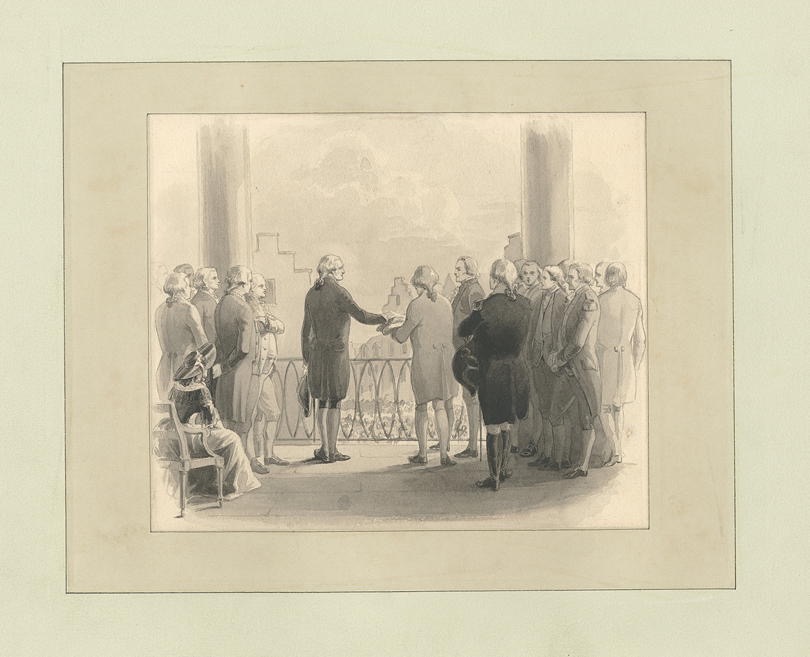
Unknown: Washington swearing the oath of office (nineteenth century)
" … the only thing standing between any of us and absolute tyranny."
The Muse returned from Port Commissioner Training with new information. She'd won the election with less than a complete understanding of what she was running for then. The office had a rough job description, but then job descriptions, by long tradition, barely scratch the surface of describing actual responsibilities. Historical precedent tends to expand or contract the delineated scope, and simple preference can profoundly influence what such jobs entail. She could become an activist or a pacifist, depending. The training presented legal boundaries and explained implications. The notion that candidates cannot be required to satisfy certain conditions proved to be among the more surprising revelations.
Candidates have always been required to meet two broad conditions: that they are a citizen of a certain age of the municipality within which they intend to serve and that they swear to uphold the constitution of that same place.
TheBus
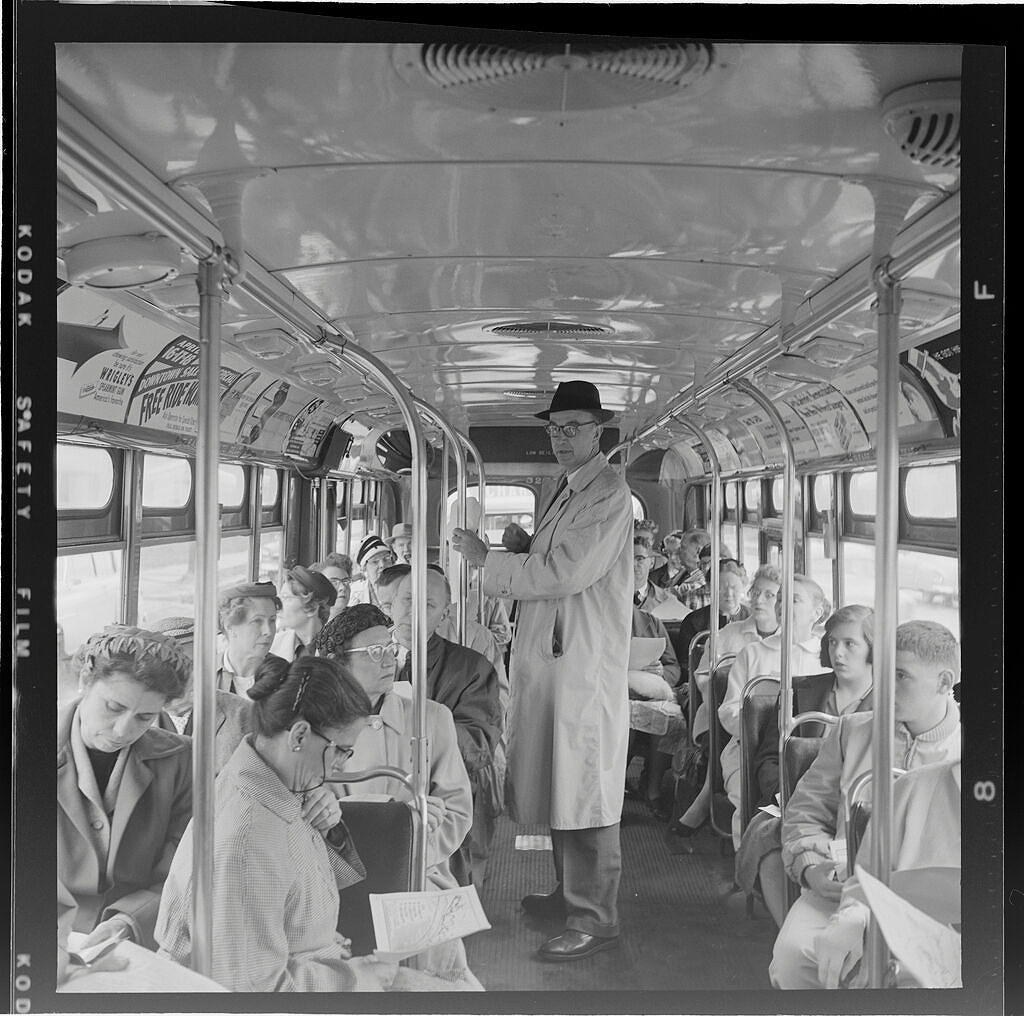
Jack Gould: Untitled (passengers on crowded city bus) (c. 1950)
"I wonder if we'll follow through."
Elizabeth, the other car I primarily use as a pickup, even though it's a luxury Lexus, was in the shop but ready to get picked up. I decided that I would, for a change if for nothing else, hop TheBus down to the shop. I could have walked it in reasonably short order, but it was a drizzly morning, and after last week's traveling, I needed something different. The Muse said she could just drop me off, but where was the adventure in that? I invited her to ride TheBus with me instead, if only to see how some of her new constituents lived. She accepted.
The Muse and I are staunch bus veterans, each hopping busses through most of our first professional careers.
ShowingUp

Jan Toorop: The Arrival of the Muses of Art at Architecture (1890)
" … tomorrow will bring yet another opportunity for selfless service."
The ArmCandy role requires more than merely SuitingUp. The successful incumbent must also ShowUp at a surprising variety of functions, many innocuous and many others substantive. Evenings, once reserved for rest and recuperation, become crowded with invitations. Organizations of every stripe send invitations where the Commissioner simply must appear. Her appearances with ArmCandy in tow might improve her visibility and effectiveness. I'm expected to show up invisible, sans obvious agenda, and do little more than whisper encouragement and questions. I do not have to pay attention to the proceedings. Indeed, it might be better for all involved if I reserve comment, for I'm no fool. I carry decades of group process experience and can determine when another cluster fuck's emerging. It's not the ArmCandy's job to intervene, though. I can mutely watch or quietly excuse myself when the proceedings turn too dicey.
Of course, I'm not merely The Muse's ArmCandy.
SuitingUp
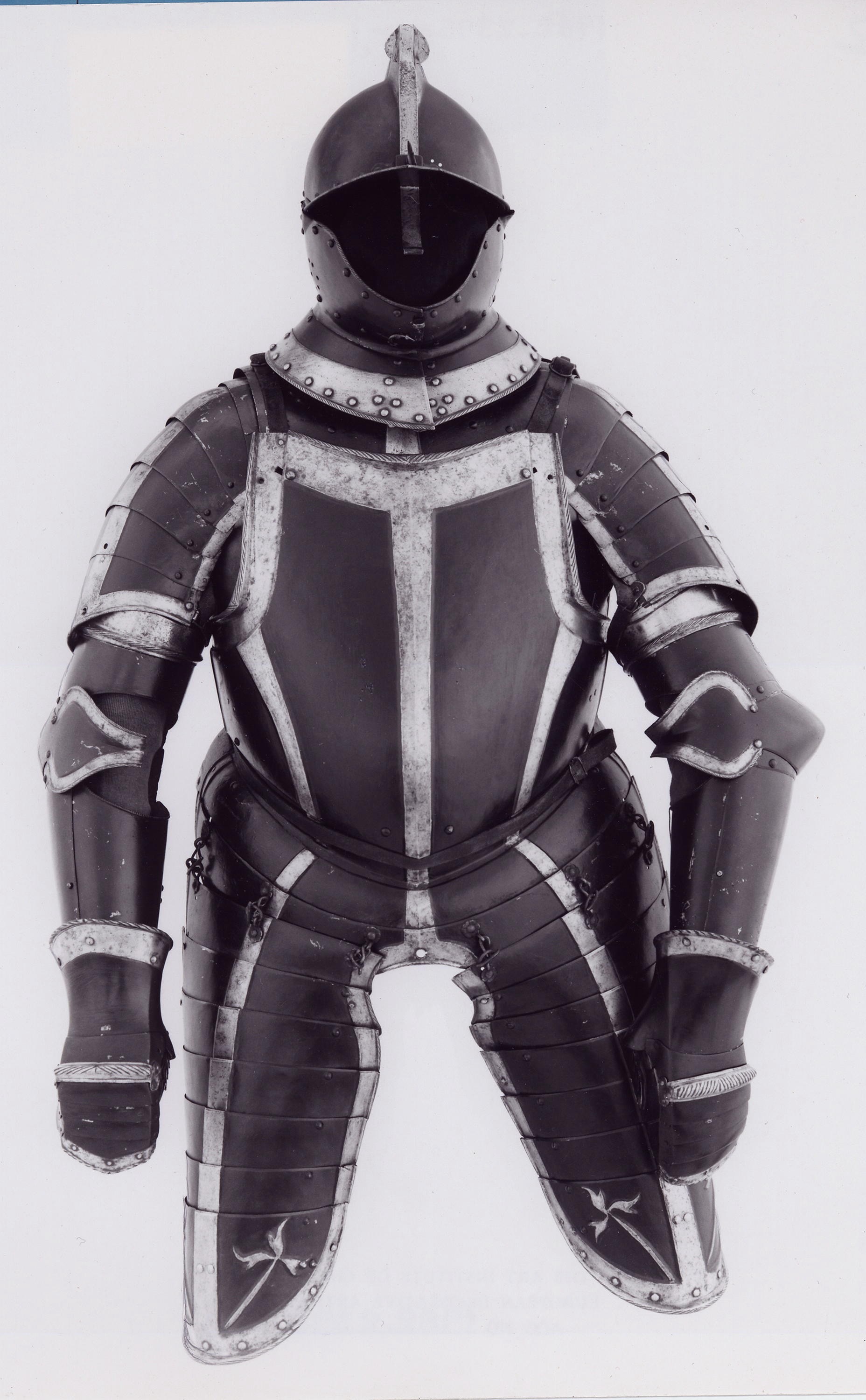
North German: Infantry Armor (c. 1550-60)
" … may I please remember who I've been and who I became …"
Starting to explore the positives associated with my new role as ArmCandy, I experienced a sensation from the past when dressing for an outing: the feeling of truly fine shirt fabric against my skin. I surrendered my wardrobe once it became moot. When I no longer had any reason to be SuitingUp in the morning, I reverted to more practical choices. My three-piece suits fell into disuse. Even my sports coats moldered in the furthest back corner of my closet. Most eventually gravitated toward a donation bin at a local Goodwill® shop and were soon forgotten. Not so easily discarded, though, was that sensation of SuitingUp. I missed that ritual, that reassuring sequence of unfolding the laundered shirt and putting on those pants, choosing a tie to match, and filling my pockets with wallet, comb, and handkerchief. I wouldn't leave until I'd passed muster with everything in place. I felt as though I was donning my armor in preparation for combat. I probably was.
In the evening, I'd reverse the sequence.
ArmCandy
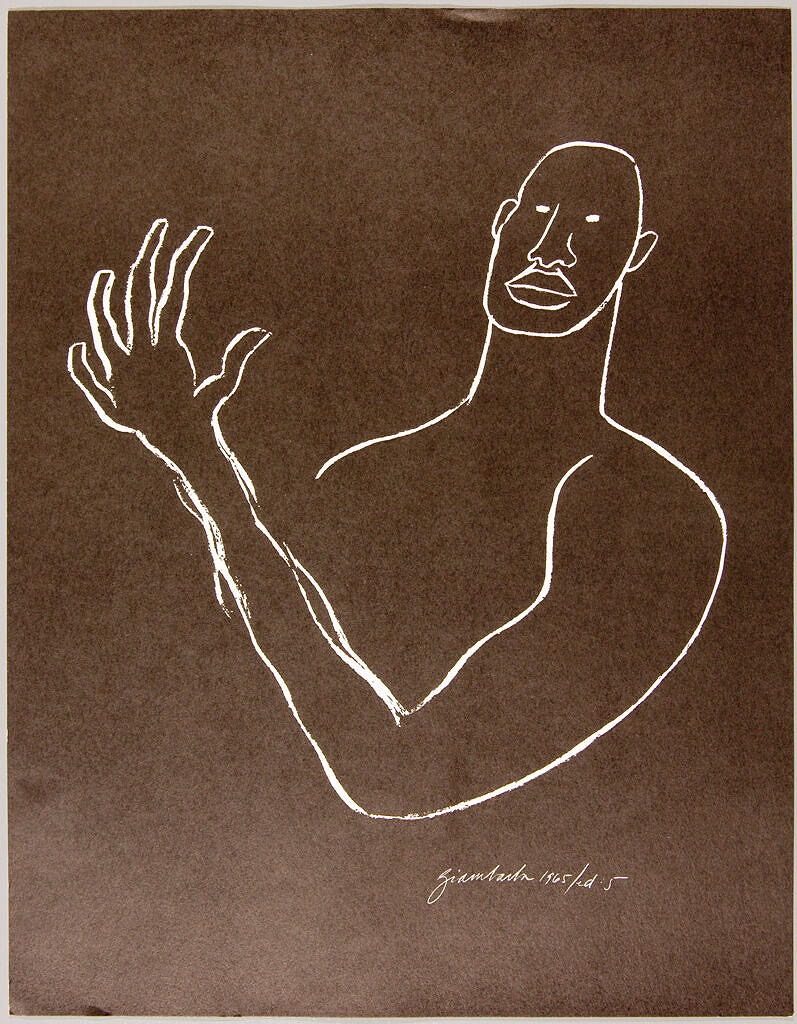
Paul Giambarba: The Withered Arm (c. 1960)
" … practicing holding out my pinkie finger just so …"
The Muse was invited to attend a Port Commissioner Orientation session as her first official function in her newly elected role. This would undoubtedly be the first of innumerable functions she will attend after she's sworn into office later this month. Like many elected offices, the Commissioner's role might be fairly classified as functionary since it involves performing official functions, often publicly. These will include endless lunches and official dinners, many of which the spouse has traditionally been obligated to attend. As the first female Port Commissioner in this body's history, The Muse drags along her form of First Husband rather than the more traditional aging bride. The beauty accompanying the functionary beast has traditionally been colloquially referred to as ArmCandy, a role I have now been conscripted to play.
I was not elected to the ArmCandy position.
Writing Summary For The Week Ending 12/07/2023
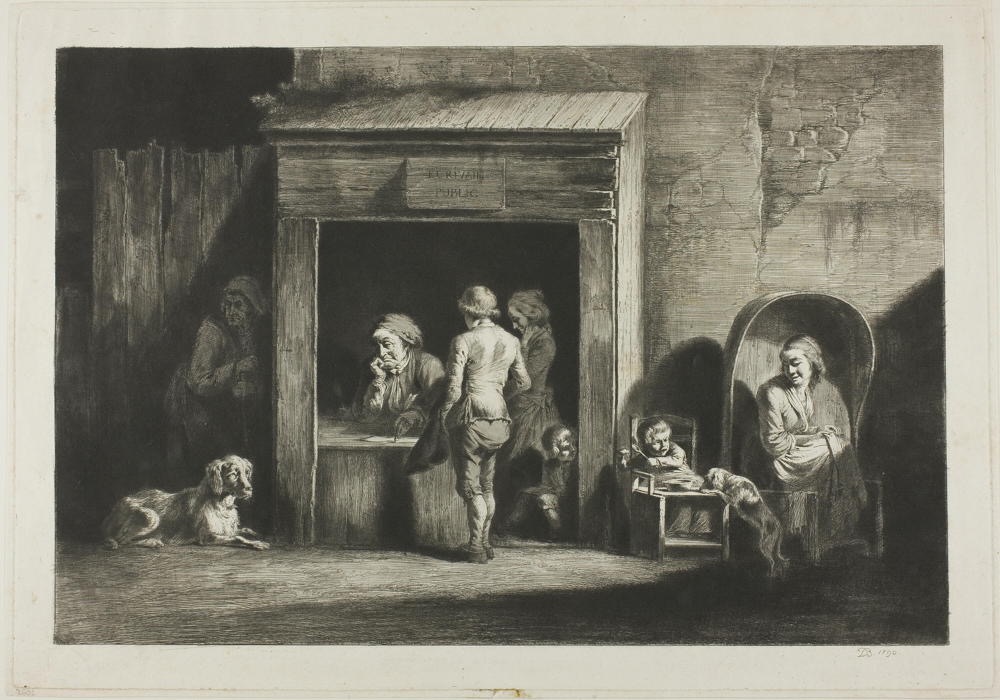
Jean Jacques de Boissieu: The Public Scribe (1790)
To Thrive On The Absurdity
They refer to them as old haunts not because the present revisits the past there but because what's now past was present then, and we who were present were ghosts then, just as certainly as we continue to be ghosts today. Consider how much of our presence hung around on that stage to be revisited later. (Nada!) This writing week's revelation revealed simply that concept, as I attempted to explain in GhostVisiting. I barely qualify as a being, just about as much as I ever qualified as a had-been or as a has-been, either. I keep moving, hardly resting between infatuations, sincerely dreading each new attraction. I remain sincerely up to something of very little consequence. I almost exclusively accomplish the ethereal. I produce little material, rarely bothering to print off my production, that being both expensive and curiously redundant. My work should properly remain virtual, ghostly, and essentially immaterial. I amuse myself by making my keyboard click. I seem to thrive on the absurdity of this.
ChildishThings
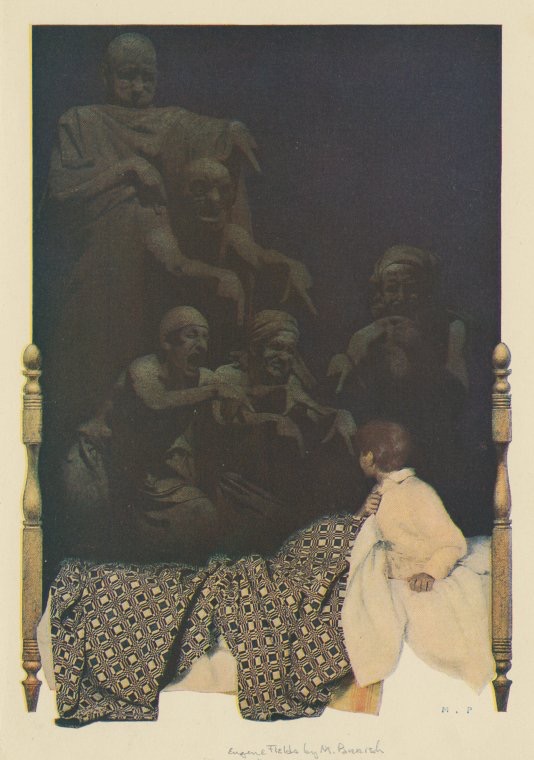
Maxfield Parrish: Seein' Things (1904)
"I was once addicted to life …"
Aging seems to reduce into a process of weaning myself off earlier fixations, some of which managed to metastasize into genuine addictions while others never progressed beyond predilection. Of all the so-called skills I've acquired in this life, my begrudging ability to break entrenched behavior patterns amounts to my greatest superpower. I always initiated these terrible interventions under unadvantageous circumstances, often without a shred of evidence that I might succeed. I initially forced myself, no matter how necessary or desperate the effort. I never once wanted to grow up in that way, to finally face responsibility and make anything better. I was never courageous, never brave, though I admit that I sometimes ascribed success as the result of my dedication rather than desperation.
Meals were once a necessity.
GhostVisiting

Albrecht Dürer: Descent of the Holy Ghost (c. 1510)
“I must be the ghost of my Christmases past …”
The Muse, my son Wilder, and I reverently stood in shock over my daughter's gravestone. The conflict inherent in seeing evidence of a member of the next generation gone took my breath. Whatever story I might have conjured to explain her absence these last two years and ten months resolved itself in granite, for there it was, the name my first wife Betsy and I had given our darling baby daughter, etched in stone, the stone of her maternal great grandmother with whom she shared the name Astrid and now her grave. I've always loved that name, and it so well complemented her first name, Heidi. Heidi Astrid, 1982 - 2021: was her presence already receding, or was ours just proceeding onward?
There are many reasons we pray that our children will outlive us here.
GhostWriting
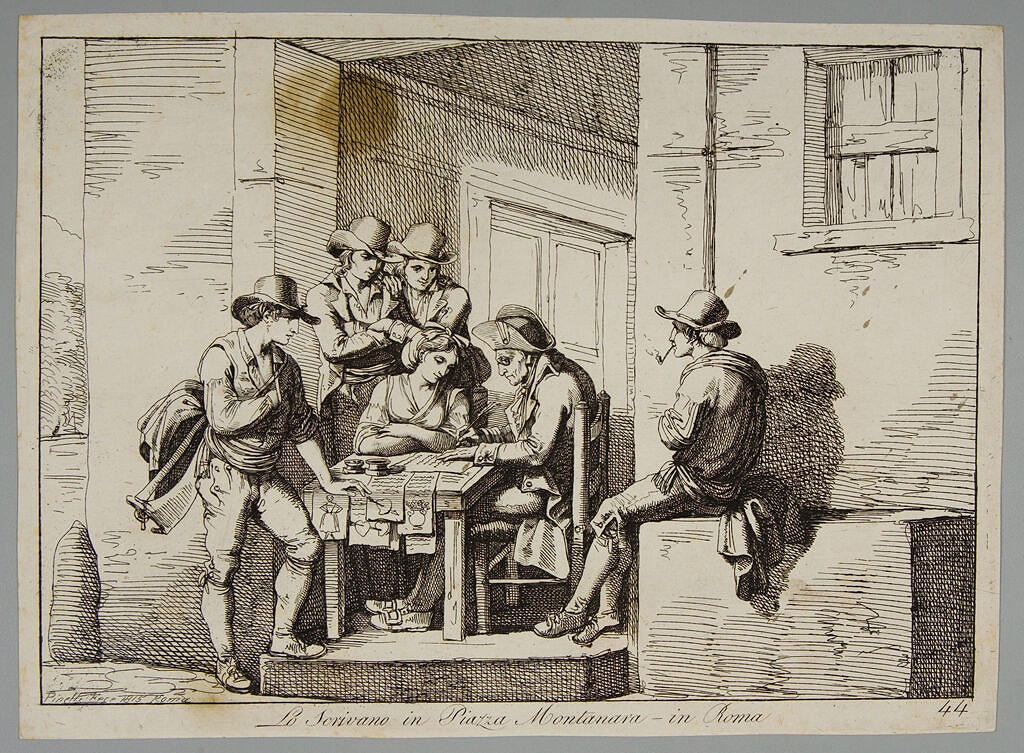
Bartolomeo Pinelli:
The Letter-writer in Piazza Montanara in Rome
(19th century)
" … an utterly impossible aspiration …"
This week's excursion has taken us into territory I once inhabited, though seemingly several lifetimes ago. I have been experiencing real trouble distinguishing between now and then, and I'm finding that I revere the past more than the present. The present seems like a Fun House Mirror reflection of the familiar, similar but degraded, whatever the advertised improvement. The world has changed over the last fifty years but somehow failed to improve, for the replacements I find masquerading fall utterly flat when attempting to live up to even a distant shadow of my expectations. When home, continual exposure lessens this effect, though it's certainly still present. Traveling, I have only current sensory experience to compare with my expectations, so I live in continual discouragement.
I remember when because I still live there.
Vexpectations
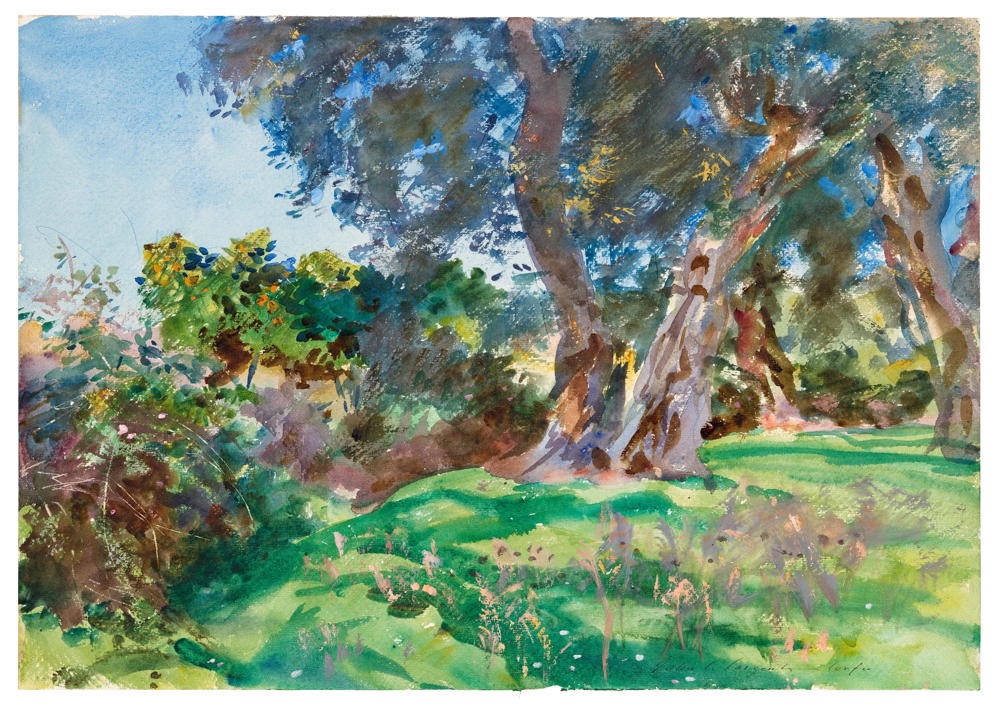
John Singer Sargent: Olive Trees, Corfu (1909)
" … just the sort of vigilance succeeding demands."
Much of whatever ends up constituting GoodNuff stems from expectations. It seems I can guarantee better-than-expected results by merely expecting things to turn out worse. While this focus might produce an Eeyore existence, it might reasonably assure that actual experience, aside from the self-induced expecting, reliably ends up being better than expected, if only because whatever else I might propose, the worse rarely results. More often, an outcome registers a meh on the grand scale of experience, neither great nor terrible, somewhere in the middle. The outcome might only sometimes register, given the swirl of experiences stemming from a swirl of expectations. Connections easily get lost and seem meaningless. Even when I fuss and fret, my anticipations might get lost in rounding on my monthly account statement. It sometimes pays to be inattentive.
Our drive from Portland to Sleaseattle proved almost effortless, even though I'd invested so much time dreading the experience.
Dread
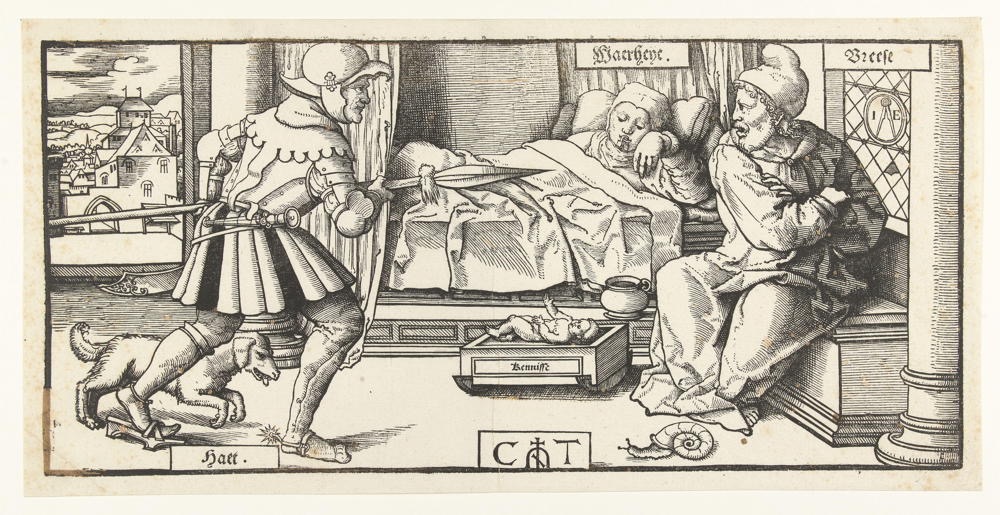
Cornelis Anthonisz:
Allegorie met Waarheid, Kennis, Haat en Vrees
[Allegory with Truth, Knowledge, Hatred, and Fear]
(1507 - 1553)
"I seem to chase off worst case scenarios …"
I prepare for each of my adventures by practicing Dread. Over my lifetime, I've fed myself so much anticipatory doom that it's a genuine marvel that I have somehow survived. I might have succumbed to the effects of pre-living my demise. My salvation might no longer be possible by any means. I might have doomed myself by conjuring visions of my end whenever I even consider engaging in anything. If we get what we expect, I should rightfully expect Hellfire and eternal damnation coming, for that's surely what I have been expecting, though every damned time so far, I've somehow sidestepped that sure and all but inevitable fate. I suppose that it's never too late to fail, but my long string of successes has so far delayed the reckoning. I feel certain each time, though, that this time, I might finally be destined to succeed in failing, and so I dread anew.
I invested much of the week before this latest excursion, denying it would happen.
Hardworker
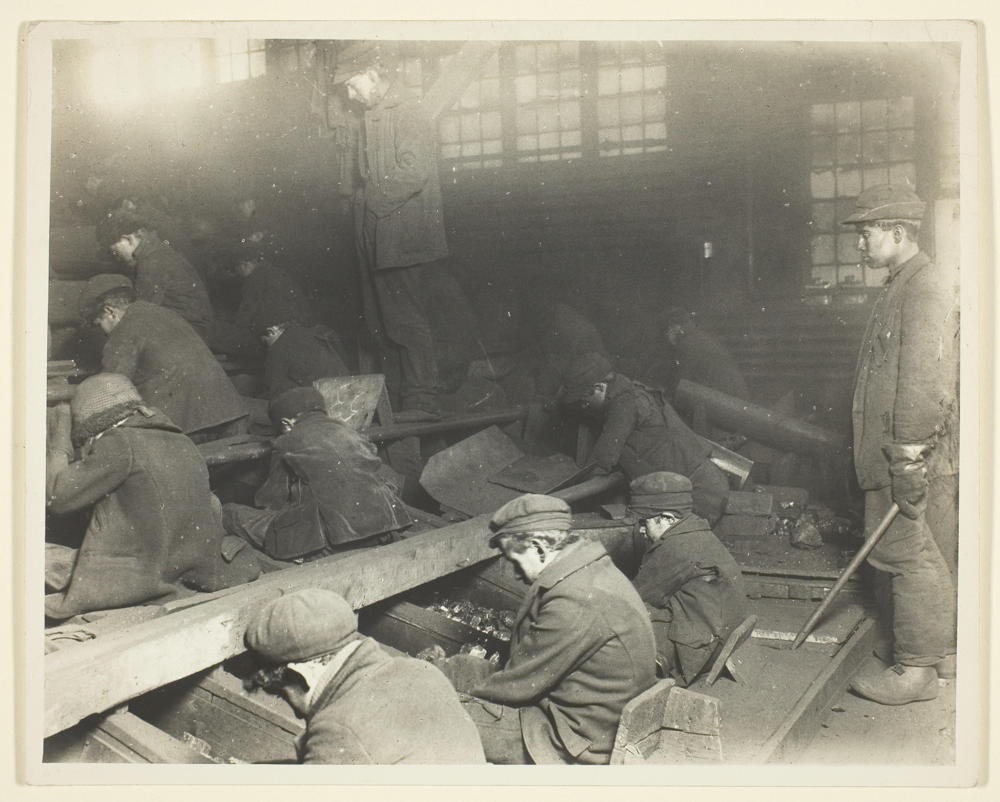
Lewis Wickes Hine:
A View Of Workers In Ewen Breaker
Of Pennsylvania Coal Company (1911)
"One might, with practice, even eventually become an EasyWorker sometimes."
Whatever the profession, in this culture, we expect every practitioner to be a self-proclaimed HardWorker. Hard work, as opposed to all the other kinds of work, seems to be an integral part of the much-touted and probably mythical American Way. If we're not killing ourselves to maintain our existence, our existence ain't worth much. HardWorker seems to be the essential marker of morally upstanding people, too, for lowlifes seem best characterized as slackers. HardWorkers have no time for lowlier pursuits. They're tuckered out by the end of their shifts.
Curiously, the HardWorker designation belongs to more than just the exhausted laborer.


